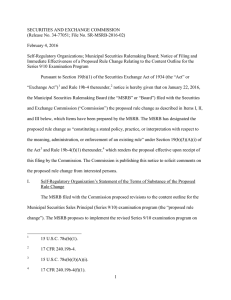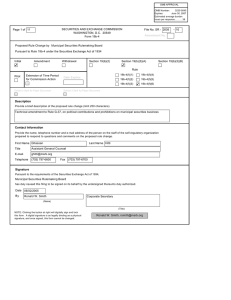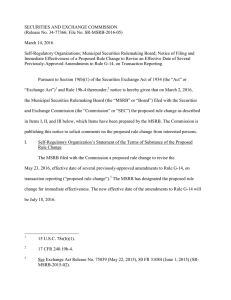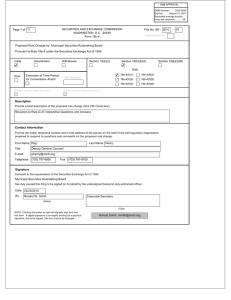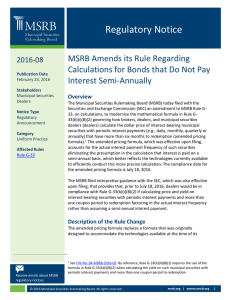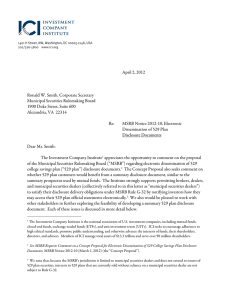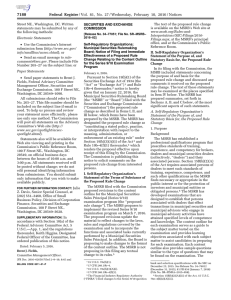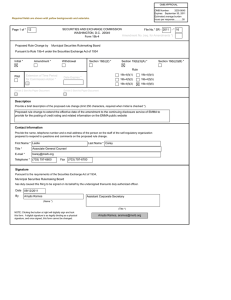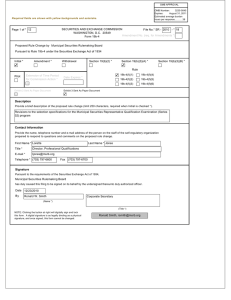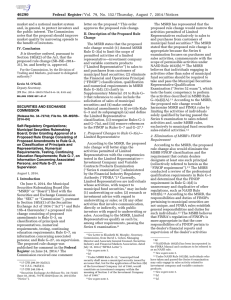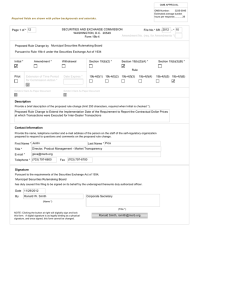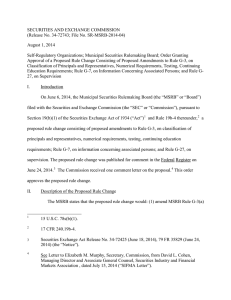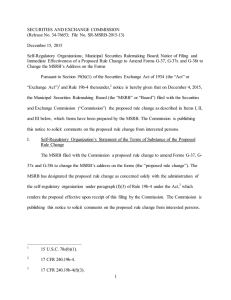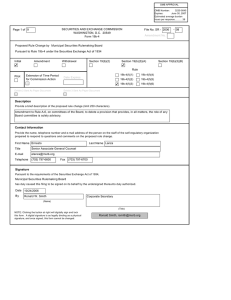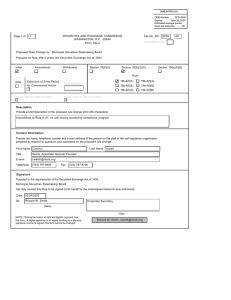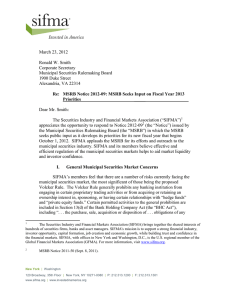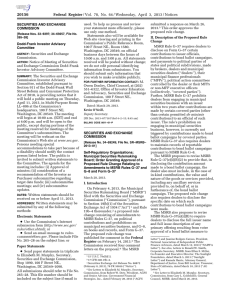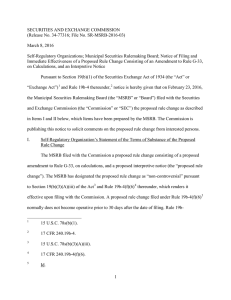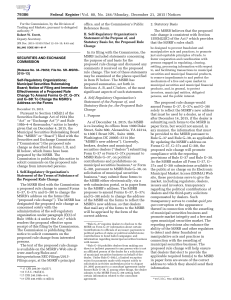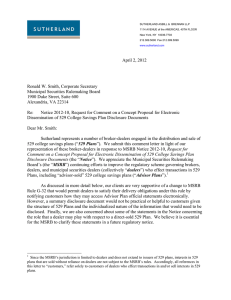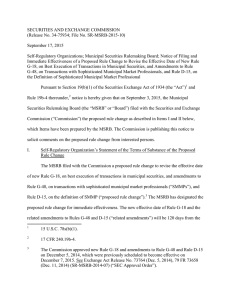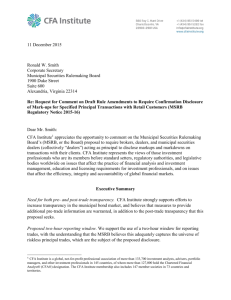529 College Savings Plans What You Should Know
advertisement
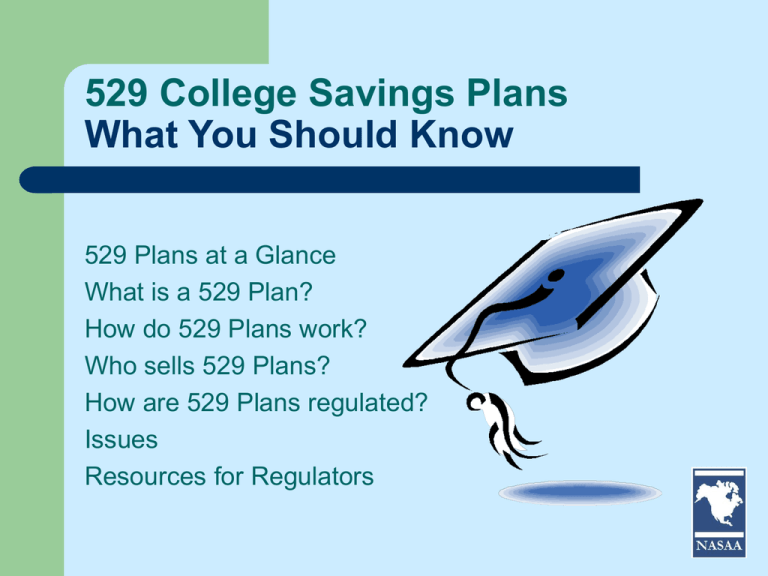
529 College Savings Plans What You Should Know 529 Plans at a Glance What is a 529 Plan? How do 529 Plans work? Who sells 529 Plans? How are 529 Plans regulated? Issues Resources for Regulators 529 Plans: What You Should Know What is a 529 Plan? Established under Internal Revenue Code 529, a 529 College Savings Plan is a qualified tuition program through which individuals make investments to accumulate savings for qualified higher education costs for beneficiaries. 529 plans allow investors to save money in an account in which the earnings grow income-tax deferred and when used to pay for "qualified higher education expenses" will be federal income tax-free. 529 Plans: What You Should Know What is a 529 Plan? In many states, participants receive state incentives, including tax deductions and exemptions, based on their participation in the in-state program(s). 529 Plans: What You Should Know What is a 529 Plan? There are 2 kinds of 529 plans: PREPAID Plans & INVESTMENT/SAVINGS Plans 529 Plans: What You Should Know What is a 529 Plan? PREPAID PLANS Purchase future tuition today at a lower rate at any of a state’s eligible colleges or universities (or equal payments to private and out-of-state institutions). These programs pool money and make long-range investments so that earnings meet or exceed college tuition increases in the home state. 529 Plans: What You Should Know What is a 529 Plan? INVESTMENT/SAVING PLANS Allows participants to save money in a college savings account to fund a designated beneficiary’s qualified higher education expenses. Contributions limits vary depending on the characteristics of individual plans. 529 Plans: What You Should Know What is a 529 Plan? Plans offer a variable rate of return based on the performance of the underlying investments. Plans generally carry investment risk, which means the account value may increase or decrease depending on market conditions. 529 Plans: What You Should Know At a Glance QUICK STATS Number of 529 College Saving Plan Accounts: 7.2 million Account Value: $64.6 billion 97 percent of 529 Plan assets are in mutual funds Source: College Savings Plan Network, as of 9/30/04 529 Plans: What You Should Know At a Glance 529 Plan Growth 1996-2005 Source: College Savings Plan Network, as of 9/30/04 529 Plans: What You Should Know How 529 Plans Work Individuals purchase interests in a trust established by the state or its instrumentality. Trust assets are invested according to the trust’s stated investment objectives. Issuers typically engage investment management firms to manage the investment of trust assets. 529 Plans: What You Should Know Who Sells 529 Plans? Many states market their 529 Plans directly to investors using state personnel. In some states, investments may only be made through state personnel; in others, investments may only be made through broker-dealers; and in others, investments may be made by either. 529 Plans: What You Should Know Who Sells 529 Plans? Most states engage broker-dealers to serve as primary distributors for their 529 Plans. In many cases, primary distributors enter into selling arrangements with other broker-dealers to serve as selling dealers to provide additional channels to distribute securities to customers. 529 Plans: What You Should Know How are 529 Plans Regulated? Although most 529 Plans have been modeled after mutual funds or "funds of funds," they are not subject to regulation under the Investment Company Act. 529 College Savings Plans, when established by states, are considered municipal fund securities and must comply with rules issued by the Municipal Securities Rulemaking Board (MSRB). Pre-paid 529 Plans are not municipal fund securities. 529 Plans: What You Should Know How are 529 Plans Regulated? The MSRB defines MUNICIPAL FUND SECURITY as: “A municipal security issued by an issuer that, but for section 2(b) of the Investment Company Act of 1940, would constitute an investment company. Municipal fund securities generally have features similar to mutual funds and are not fixed income securities. Interests in . . . 529 college savings plans are examples of municipal fund securities.” 529 Plans: What You Should Know How are 529 Plans Regulated? Municipal fund securities are equity interests in an independently managed pool of investments. Investors realize gains or losses based on the performance of the pool's underlying assets. Although municipal fund securities are similar to registered mutual funds, they are not subject to most of the federal securities laws applicable to mutual funds. This is because municipal fund securities are issued by state or local governments, which generally are exempt from these laws. 529 Plans: What You Should Know How are 529 Plans Regulated? Broker-dealers that effect transactions in municipal fund securities must comply with: – – – MSRB rules Anti-fraud provisions of the federal securities laws Securities laws of individual states 529 Plans: What You Should Know Issues 529 plans present all of the potential suitability, disclosure and other sales practice issues as do mutual funds. Disclosure Fees & Commissions Suitability Sales Practices 529 Plans: What You Should Know Issues: Who’s Concerned States College Saving Plan Network MSRB SEC NASD Congress 529 Plans: What You Should Know Issues: What’s Being Done States: Exams, Board-level Project Group College Saving Plan Network – Disclosure Guidelines MSRB – Proposed rules SEC – Task force, sweep NASD - Sweep Congress: Hearings 529 Plans: What You Should Know Issues: Disclosure MSRB Rule G-17: – Requires a broker-dealer to disclose at the point-of-sale all material facts about the transaction known by the dealer, as well as material facts about the security that are reasonably accessible to the market. – Obligates a broker-dealer that sells to a customer an out-ofstate college savings plan to disclose that, depending upon the laws of the customer’s home state, favorable state tax treatment for investing in a college savings plan may be limited to investments made in a college savings plan offered by the customer’s home state. 529 Plans: What You Should Know Issues: Disclosure MSRB is seeking to broaden Rule G-17 point-of-sale disclosure interpretation to: – Include references to other potential benefits of in-state investments. – Suggest that customers consult with a qualified adviser or contact his or her home state’s college savings plan to learn more about any state tax or other benefits that might be available in conjunction with an investment in that state’s college savings plan. 529 Plans: What You Should Know Issues: Disclosure A broker-dealer would violate Rule G-17 by: – Informing a customer that investment in the college savings plan of the customer’s own state did not provide the customer with any state tax or other benefit when the dealer knows or has reason to know that such benefit likely would be available. – Informing a customer that investment in the college savings plan of another state would provide the customer with the same tax or other benefits as would be available if the customer were to invest in his or her own state’s plan, if the dealer knows or has reason to know that this is not the case. 529 Plans: What You Should Know Issues: Disclosure VOLUNTARY CSPN GUIDELINES In December 2004, the College Savings Plan Network, an affiliate of the National Association of State Treasurers issued a series of voluntary disclosure guidelines for 529 plans. The voluntary guidelines are intended to: – – – establish a reference for basic disclosure practices improve comparability between Plans improve comparability, where applicable, between Plans and direct investment in mutual funds 529 Plans: What You Should Know Issues: Disclosure VOLUNTARY CSPN GUIDELINES Establish a framework for disclosure and specify information that should be prominently stated, such as: – the lack of any state guarantee – the need to consider state tax treatment and other state-specific benefits – the availability of other state 529 programs. 529 Plans: What You Should Know Issues: Fees & Commissions All 529 plans charge fees and expenses.These costs not only vary among 529 plans but also can vary within a single 529 plan. Fees may include: – enrollment charges – annual maintenance fees – sales loads – deferred sales charges paid when investors withdraw their money – administration and management fees and underlying fund expenses. 529 Plans: What You Should Know Issues: Fees & Commissions Advisor-sold plans often cost more than direct-sold plans. Some broker-sold college savings plans, like some mutual funds, have different share classes (Class A, B, C, etc). Each class has different fees and expenses. 529 Plans: What You Should Know Issues: Fees & Commissions MSRB Rule G-30(b), on prices and commissions in agency transactions, prohibits broker-dealers from selling municipal securities to a customer for a commission or service charge in excess of a fair and reasonable amount. What’s “fair and reasonable?” 529 Plans: What You Should Know Issues: Fees & Commissions MSRB Rule G-30(b)rule provides for considering a number of relevant factors, including: – – – the expense of executing the order the value of services provided, and the amount of any other compensation received by the broker-dealer from others (such as the state plan or the primary distributor). 529 Plans: What You Should Know Issues: Suitability • MSRB Rule G-19 requires a broker-dealer that recommends to a customer an investment in a 529 college savings plan to have reasonable grounds for believing that the recommendation is suitable, based on information available about the investment and information on the customer’s financial status, tax status, investment objectives and other relevant information. 529 Plans: What You Should Know Issues: Suitability SUITABILITY ON THREE LEVELS • 529 Plans vs. other investment alternatives • In-state plan sales vs. out-of-state plan sales • Underlying investments 529 Plans: What You Should Know Issues: Suitability • The MSRB has stated that broker-dealers must remember that 529 Plans are designed for a particular purpose and this purpose should match the customer’s investment objective. • For example, broker-dealers should bear in mind potential tax consequences for customers who invest in a 529 Plan but may not intend to use the funds for qualified higher education expenses. 529 Plans: What You Should Know Issues: Suitability Other factors to consider to determine suitability: • The age of the account’s designated beneficiary; • The number of years until funds will be needed to pay qualified higher education expenses. 529 Plans: What You Should Know Issues: Suitability • Broker-dealers must consider the appropriate share class for a particular customer. • The number of years until withdrawals are expected to be made can be a significant factor in determining which share class would be suitable for the particular customer. • Broker-dealers also are prohibited from recommending excessive or frequent transactions . 529 Plans: What You Should Know Issues: Sales Practices • PROBLEM AREA: Sales of out-of-state plans. • In 2003, the NASD conducted a review of sales practices used by broker-dealers to market 529 Plans. • The review focused on six firms, based on the number of customer complaints and sales volume. 529 Plans: What You Should Know Issues: Sales Practices Preliminary NASD Sweep Findings • During the review period, the firms sold approximately $2.1 billion worth of 529 plans. • The vast majority of sales were made to residents outside of the state that sponsored the 529 plan. 529 Plans: What You Should Know Issues: Sales Practices Preliminary NASD Sweep Findings • More than 90 percent of the sales by some of those firms were to out-of-state residents, despite the fact that about half of the states give a state tax deduction to their citizens for contributions to the home state's 529 plan. 529 Plans: What You Should Know Resources for Regulators College Savings Plan Network The College Savings Plans Network formed in 1991 as an affiliate to the National Association of State Treasurers. CSPN serves as a clearinghouse for information among existing college savings programs. Additionally, CSPN monitors federal activities and promotes legislation that will positively affect state programs. www.collegesavings.org 529 Plans: What You Should Know Resources for Regulators Municipal Securities Rulemaking Board www.msrb.org The MSRB was established in 1975 by Congress to develop rules regulating securities firms and banks involved in underwriting, trading, and selling municipal securities. Composed of members from the municipal securities dealer community and the public, MSRB sets standards for all municipal securities dealers. MSRB is is a selfregulatory organization that is subject to SEC oversight. 529 Plans: What You Should Know Resources for Regulators Saving for College.com www.savingforcollege.com Savingforcollege.com LLC offers independent and objective information about 529 plans and other ways to save and pay for college. The website, operated by founder Joseph Hurley CPA, is designed to help individuals and professional advisers better understand 529 Plans and is not affiliated by ownership with any other company or organization. 529 Plans: What You Should Know Resources for Regulators NASAA, along with the College Savings Plan Network and the Investment Company Institute, have published A Guide to Understanding 529 Plans. The brochure is available on the NASAA website in the Investor Education Section’s Financial Education Resources page. www.nasaa.org/investor_education/Financial_Education_Resources 529 Plans: What You Should Know
